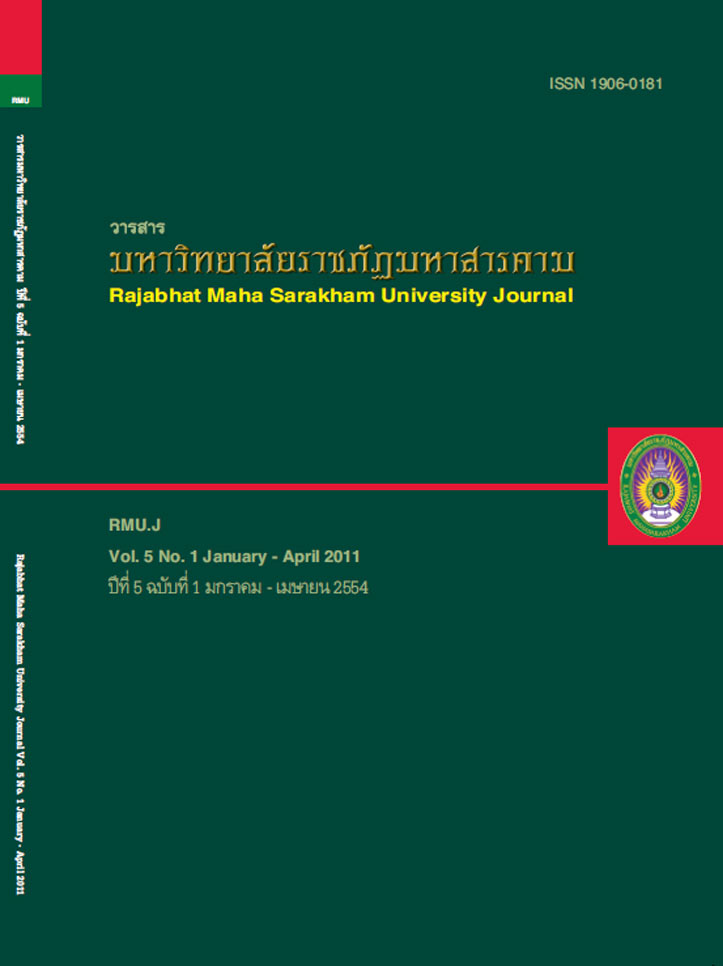สภาพการบริหารงานวิชาการในสถานศึกษาขั้นพื้นฐาน ช่วงชั้นที่ 1-2 สังกัดสำนักงานเขตพื้นที่การศึกษามหาสารคาม เขต 2; The Status on Academic Administration in Basic Education Institutions Level 1-2 under Maha Sarakham Educational Service Area Office 2
Main Article Content
บทคัดย่อ
การวิจัยครั้งนี้มีวัตถุประสงค์เพื่อศึกษาสภาพ และเปรียบเทียบระดับการบริหารงานวิชาการ ตามความคิดเห็นของ
ผู้บริหารสถานศึกษา ครูผู้สอน และประธานกรรมการสถานศึกษาขั้นพื้นฐาน ในสถานศึกษาขั้นพื้นฐานช่วงชั้นที่ 1-2 สังกัด
สำนักงานเขตพื้นที่การศึกษามหาสารคาม เขต 2 โดยรวมและรายด้าน กลุ่มตัวอย่าง ได้แก่ ผู้บริหารสถานศึกษา ครูผู้สอน
ประธานกรรมการสถานศึกษาขั้นพื้นฐาน ปีการศึกษา 2550 จำนวน 335 คน ได้มาโดยการสุ่มแบบแบ่งชั้น เครื่องมือที่ใช้ในการ
เก็บรวบรวมข้อมูล คือแบบสอบถามมาตราส่วนประมาณค่า จำนวน 64 ข้อ มีค่าความเชื่อมั่นทั้งฉบับเท่ากับ 0.98 สถิติที่ใช้ในการ
วิเคราะห์ข้อมูล ได้แก่ ร้อยละ ค่าเฉลี่ย ส่วนเบี่ยงเบนมาตรฐาน ใช้การวิเคราะห์ความแปรปรวนทางเดียว (One–way analysis of
variance) ผลการวิจัยพบว่า
1. สภาพการบริหารงานวิชาการในสถานศึกษาขั้นพื้นฐานช่วงชั้นที่ 1-2 สังกัดสำนักงานเขตพื้นที่การศึกษา
มหาสารคาม เขต 2 รวมทุกด้านอยู่ในระดับมาก เรียงลำดับเฉลี่ยจากมากไปหาน้อย 3 ลำดับแรก คือ ด้านการพัฒนากระบวนการ
เรียนรู้ ด้านการพัฒนาการประกันคุณภาพภายในสถานศึกษา และด้านการวัดผลประเมินผลและเทียบโอนผลการเรียน
2. ผลการวิเคราะห์เปรียบเทียบระดับการบริหารงานวิชาการ ตามความคิดเห็นของผู้บริหารสถานศึกษา ครูผู้สอน
ประธานกรรมการสถานศึกษาขั้นพื้นฐานในสถานศึกษาขั้นพื้นฐาน ช่วงชั้นที่ 1-2 สังกัดสำนักงานเขตพื้นที่การศึกษามหาสารคาม
เขต 2 โดยรวมไม่แตกต่างกัน แต่ในด้านการพัฒนากระบวนการเรียนรู้ ด้านการพัฒนาระบบประกันคุณภาพภายในสถานศึกษา
และด้านการวัดผลประเมินผลและเทียบโอนผลการเรียน มีความแตกต่างกัน
3. ข้อเสนอแนะเกี่ยวกับการบริหารงานวิชาการในสถานศึกษาขั้นพื้นฐาน ช่วงชั้นที่ 1-2 สังกัดสำนักงานเขตพื้นที่การ
ศึกษามหาสารคาม เขต 2 ได้แก่ ควรมีการแลกเปลี่ยนเรียนรู้ และร่วมมือในการพัฒนางานวิชาการระหว่างโรงเรียน ควรส่งเสริม
สนับสนุนให้ครูใช้แหล่งเรียนรู้ทั้งในและนอกสถานศึกษาโดยครอบคลุมภูมิปัญญาท้องถิ่น และควรเปิดโอกาสให้ชุมชนมีส่วนร่วมในการจัดการศึกษา
This research aimed to study the status and compare the level of academic administration
according to the opinions of the educational institution administrators, teachers, and the chairperson of
the Basic Education Institutions committee in the Basic Education Institutions level 1-2 under Maha
Sarakham Educational Service Area Office 2, as a whole and in each aspect. The subjects, selected
through stratified random sampling, consisted of 335 educational institution administrators, teachers,
and chairperson of the Basic Education Institutions committee in the educational institutions in the
academic year 2007. The instrument used in the research was 64 items of rating scale questionnaire
with.98 of reliability. The collected data were analyzed by percentage, mean, and standard deviation.
The findings of the research were as follows:
1. The status of academic administration in the Basic Education Institutions level 1-2 under
Maha Sarakham Educational Service Area Office 2 was rated at a high level difference from high to low:
learning process development, internal quality assurance system development, and measurement and
evaluation including transferring the credits.
2. The comparison of academic administration level according to the opinions of the
educational institution administrators, teachers, and the chairperson of the Basic Education Institution
committee in the educational institutions level 1-2 under Maha Sarakham Educational Service Area
Office 2 was not significantly different as a whole. However, learning process development, internal
quality assurance system development, and measurement and evaluation including transferring the
credits were statistically different.
3. The recommendations concerning the status of academic administration in the Basic
Education Institutions level 1-2 were: there should be the exchange of experience and collaboration in
academic development among schools, teachers should be also encouraged to utilize learning sources,
including local wisdom both inside and outside the educational institutions, and finally, the community
should have an opportunity to participate in educational management
Article Details
1. บทความที่ลงตีพิมพ์ทุกเรื่องได้รับการตรวจทางวิชาการโดยผู้ประเมินอิสระ ผู้ทรงคุณวุฒิ (Peer Review) สาขาที่เกี่ยวข้อง อย่างน้อย 3 ท่าน ในรูปแบบ Double blind review
2. ข้อคิดเห็นใด ๆ ของบทความที่ลงตีพิมพ์ในวารสารมหาวิทยาลัยราชภัฏมหาสารคาม นี้เป็นของผู้เขียน คณะผู้จัดทำวารสารไม่จำเป็นต้องเห็นด้วย
3. กองบรรณาธิการวารสารมหาวิทยาลัยราชภัฏมหาสารคาม ไม่สงวนสิทธิ์การคัดลอกแต่ให้อ้างอิงแสดงที่มา


